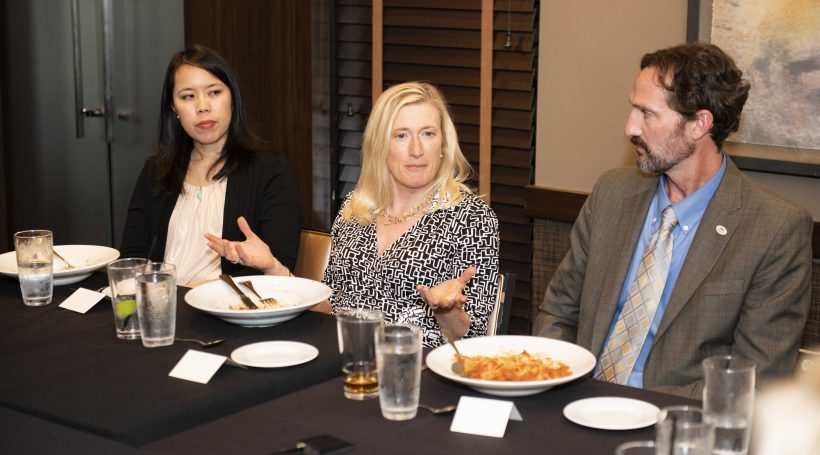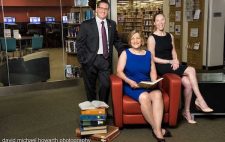Photos by David Michael Howarth
Continuing our influential series on topics important to South Jersey, SJ Magazine gathered 12 SJ experts and innovators within the special needs community. Participants were open and informative as they discussed the unique challenges and rewards for families navigating this journey.
Dennis Morgan
SVP of Children’s Services, Bancroft
Mala Gupta, MD
Director of Child and Adolescent Psychiatry, Centra
Suzanne Buchanan
Executive Director, Autism New Jersey
Caroline Eggerding
MD, Division Head, Pediatric Neurology and Development, Cooper University Health Care
Darren Blough
SVP of Adult Services, Bancroft
Patty Huang, MD
Developmental Pediatrician, Autism Integrated Care Program, CHOP
Evan Heitzman
Parent Advocate
Christopher Nagy
Superintendent, Burlington County Special Services School District
Susan Weiner
Executive Director, Larc School
Lisa Alberts
Senior Clinical Director, Children’s Health Services, Bancroft
Jim Rhodes
Deputy County Administrator, Camden County
Michelle Ennis Soreth, PhD
Associate Director, Center for Behavior Analysis, Rowan University
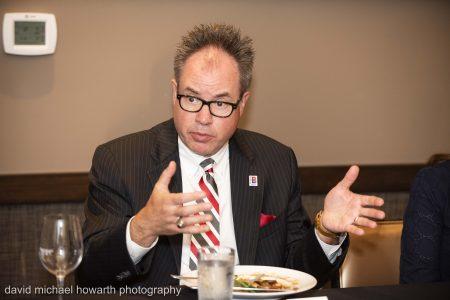 On what exactly special needs means…
On what exactly special needs means…
That term comes up because we create environments which make it difficult for some people to fully express themselves and be functional, confident, happy and content. So we adjust environments in a way that allows them to be happy, content, satisfied or successful. That’s how we came to that term – special needs.
Caroline Eggerding
Some students have an inability, whether it’s emotionally, educationally or physically, to navigate their daily life activities. As a result of that, there are various categories based upon medical authorities that enable students to receive certain services.
Christopher Nagy
On early intervention…
As soon as you see deficits, it’s best to intervene. The intervention may look different for a 6-month-old versus an 18-month-old versus a 6-year-old. But it will still be based on the same principles and practices that lead to better outcomes.
Lisa Alberts
There was a landmark study for children with autism that showed some pretty dramatic effects of early intervention. 47 percent of children who received early intervention services between the ages of 2 and 4 were indistinguishable by age 7 from their typically developing same-age peers. That 1987 study was a game changer.
Michelle Ennis Soreth
When you have an infant who’s not making milestones, then you have to look at why. Early intervention makes such a life change for so many students who might have needed a lot more as they got older, but now they need much less because they’ve been given helping hands early to make those changes.
Susan Weiner
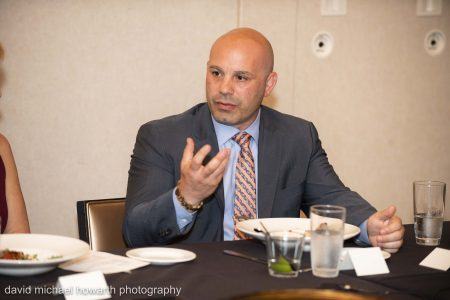 On giving families a diagnosis…
On giving families a diagnosis…
When parents don’t want “a label” for their child, I say, “We would not deny your child an inhaler that would allow them to run on the track team, right?” What will happen with these services is they’ll learn to speak better and they’ll be better at playing with other kids. If that child, with or without that label, is on the wrong developmental trajectory, then they’re on the wrong trajectory, and you have to intervene.
Mala Gupta
Some parents come in very empowered to take the next step if you give them a diagnosis, but for others, it becomes a roadblock. They don’t want to try anymore. It is definitely a tricky balance.
Patty Huang
There’s a part as a parent where you think, “Do I have to slap a label on him to get the most services? Do I care what the label is? Wait – just help me. Help me get everything I can for my son.”
Evan Heitzman
I tell the story of a dad who came to us with a 3-year-old, and in our first meeting, he was in tears. He said it was the very first time he had heard people telling him what his daughter could do, not what she couldn’t do.
Susan Weiner
Some families see the diagnosis as opening doors to services, while other families see it as closing the door to having a “normal” child.
Darren Blough
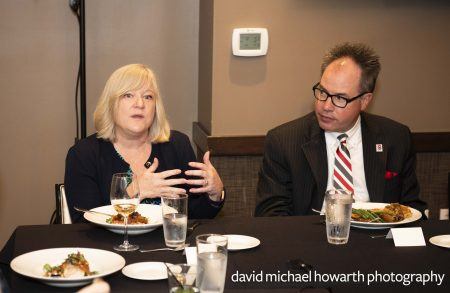
On the diagnosis…
People think of these labels in a medical sense, but they’re not medical diagnoses. They’re behavioral. They’re based on behaviors and the degree to which those behaviors impair functioning in a non-special environment. That’s how you get the diagnosis. There’s no X-ray test. I can’t flip back the skull and say, “Ah, now I know what you’ve got.”
Caroline Eggerding
When you have a child with special needs, you think you know the end of the story, but you don’t, because we’re going to intervene. I tell parents “I promise you, we cannot base their future on what they’re doing today.”
Mala Gupta
On successes…
I remember back in graduate school, when I was talking to my dad about how excited I was to work with a kid with autism who went from making unintelligible vocalizations to saying “buh” consistently for banana. And he said, “But really, how much of a difference can you make?” And I said, “Dad, do you have any idea what this family goes through on a moment-by-moment basis?” We help kids and families make gains they never thought were possible. That’s why we’re all here.
Suzanne Buchanan
In Camden County, we have therapeutic horseback riding. There is a young man who was non-verbal but had to learn three commands to ride, and for the first time in his life he said the three commands. His parents tell us now that he’s actually speaking in full sentences. I’m sure this is due, in part, to a whole regimen of activity and therapy and schooling, but it’s nice to be a part of something like that.
Jim Rhodes
A colleague of mine and I took a ride to Baltimore to screen a young man at a facility there. He had been turned down for services because his needs were so acute, but within moments, we knew we could serve this individual. Our fear was, if we didn’t accept him, who would? He was non-communicative and was playing with dog toys. But we’ve watched this individual flourish. He has graduated and moved on to our adult program and really thrives, and lives fairly independently. That’s what it’s all about – challenging the individual at each phase to take that next step toward a greater degree of independence.
Dennis Morgan
I don’t know that I ever envisioned my son having a community of friends. But when we go places, there’s the same pack of kids. He knows his people. He’s developing this life apart from us a little bit, which I never imagined. I know some day I’ll have to think about him not living with us, and I can’t envision that right now. I can’t even envision the signs I’ll have to read from him to know he’s ready for that.
Evan Heitzman
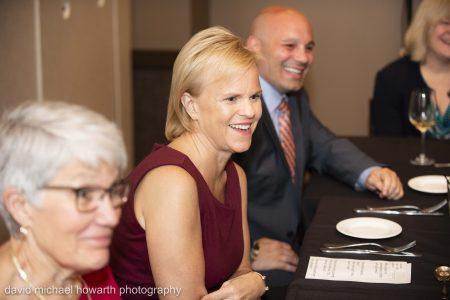 What to expect from the public school system…
What to expect from the public school system…
It depends on what the unique needs of the child may be and what the district has to offer. We service nearly 90 school districts throughout the state, plus children from other states. Not every district has the resources a particular child may need. It’s really important that a family can make the right choice for the child, but that’s not always the case, unfortunately. Families have to advocate for those resources.
Dennis Morgan
Often, we’ll see a district keep youngsters, and then around 7 or 8 years old when they’re not doing well, they come to us. But you’ve lost that prime opportunity for learning, and that’s so sad. Let them come to an out-of-district placement for a few years where the intense services can really boost that youngster.
Susan Weiner
We don’t necessarily want to have the students with us the whole time. Our objective is to get them back into their respective school systems so they can be with their peer groups and truly have a fulfilling life.
Christopher Nagy

On technology…
Technology that’s coming into the world of special education is booming. A lot of tech companies are gravitating toward innovations in this space. The future is exciting, because these types of technologies are always advancing.
Dennis Morgan
We just received MILO – the interconnectivity, the conversations and the movements of this robot make it very attractive for students with autism, particularly children in the earlier years. It’s amazing how technology will open up a number of doors that were not there before.
Christopher Nagy
When you can communicate, you have some access to what happens in your life. We keep trying and trying and trying and trying until we’re able to find what access we can give a student. We have kids in wheelchairs with very little ability to move and they can’t use their hands, but they use head switches and foot switches. These kids can now have conversations – they’re joking, they’re talking, they’re choosing. It’s wonderful.
Susan Weiner
 On advice for families with special needs children…
On advice for families with special needs children…
You’re not alone. I see so many families who’ve been doing this by themselves for so long, they have nothing left, and there are resources out there for them.
Darren Blough
When you hear those diagnoses, that’s still the same child you had yesterday.
Susan Weiner
I think parents start off a lot of times thinking it’s a sprint, and it turns out it’s a marathon. There’s so much stress and so much to do, you’re going to find more joy if you find little moments to take care of yourself.
Suzanne Buchanan
With the technology and interventions we have now, development and change will take place. It’s a general optimism that I would encourage.
Michelle Ennis Soreth
Now that there are so many parents like me, we’re in the community together, and we have after-school clubs, fitness classes, sporting events and theater and clay and art and Legos – it’s all there. No one is going to hold your hand and take you there, but the minute you’re willing to be open to this community, you’ll find incredible opportunities.
Evan Heitzman
On what people who have no experience with a special needs child should know…
We have a saying written across our atrium wall at Bancroft: One world for everyone. What that means to me is we meet people where they are. Everyone should have an opportunity to experience things we all know: swimming, biking, having friends, being social. It’s important we meet people where they are and offer them opportunities to achieve those things.
Lisa Alberts
What you see on the outside is not necessarily what’s going on inside.
Dennis Morgan
Even if two children have the same diagnosis, they have such individual strengths and challenges that you really can’t make any assumptions about what they can or can’t do.
Patty Huang
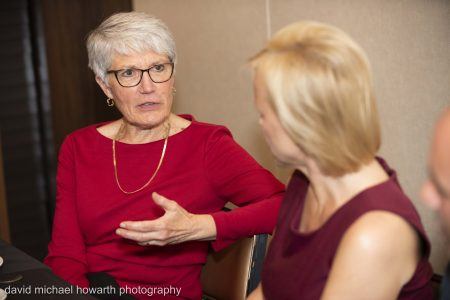 On siblings of special needs children…
On siblings of special needs children…
The siblings make so many sacrifices throughout their lives. Their brother or sister has required much of the parents’ attention, and you would expect some resentment. But actually what you see is the exact opposite. You see siblings taking on a bit of a caretaker role, and that is pretty amazing to see.
Darren Blough
For many typically developing kids, their friends are their world. So to have a brother or a sister who’s unexplainable in some ways – you must have discussions throughout their lives about what their challenges are. Try to have non-judgmental time to hear their story.
Suzanne Buchanan
We have a sibling program in the summer, and the sibs of our students come every Friday. On the last session, they can bring a friend. And where they might have been a little embarrassed about the behavior of their sib, now the kids are leaving and they’re saying, “Wow, your sister is way cool and she has the best school, and I wish our school was like that.” It changes the whole mindset. There is an understanding and acceptance, but it’s not something that just happens.
Susan Weiner
When I see students coming to college, saying their sibling is why they’re pursuing a career in this field, it’s amazing and so compassionate. They are the people who are going to be involved in the field for a long time.
Michelle Ennis Soreth
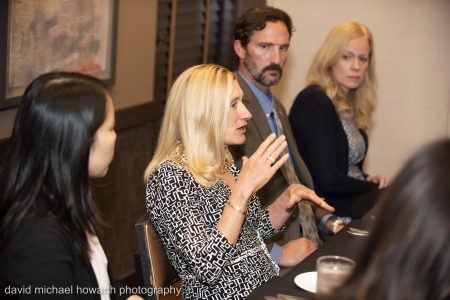 On the stigma…
On the stigma…
There’s a classic cartoon of a teacher behind the desk who says, “The test is everyone has to climb the tree.” In front of the teacher is a fish in a bowl, a snake, a monkey, an elephant, a cat and a dog. It’s a fair test, everyone has to do the same thing, climb the tree – except the abilities are different.
Caroline Eggerding
The stigma comes from thinking about a child’s challenges as deficits and not also accounting for their strengths and how they can use those strengths. That’s a really important part.
Patty Huang
Part of the reason for the stigma is the lack of awareness. Unless you work in the field or have a loved one who has a special need, there’s no exposure. It’s improved over the years, but historically, we are an under-represented population.
Darren Blough
One of the things I focus on is when students have exceptionalities that are unlike any other student, what we in education try to do is look at them and say, “What is it they have to offer so as a community we grow together?” Many times that message is missed.
Christopher Nagy
 MENU
MENU
Soup or Salad Choice
Duo Salad: mixed greens, balsamic dressing
or
Italian Wedding Soup
Entrée Choice
Chicken Marsala
or
Short Rib Ragu: short rib, fettuccine, tomato sauce
or
Pan-Seared Salmon: arugula, capers, white beans, lemon
Dessert
Cheesecake


